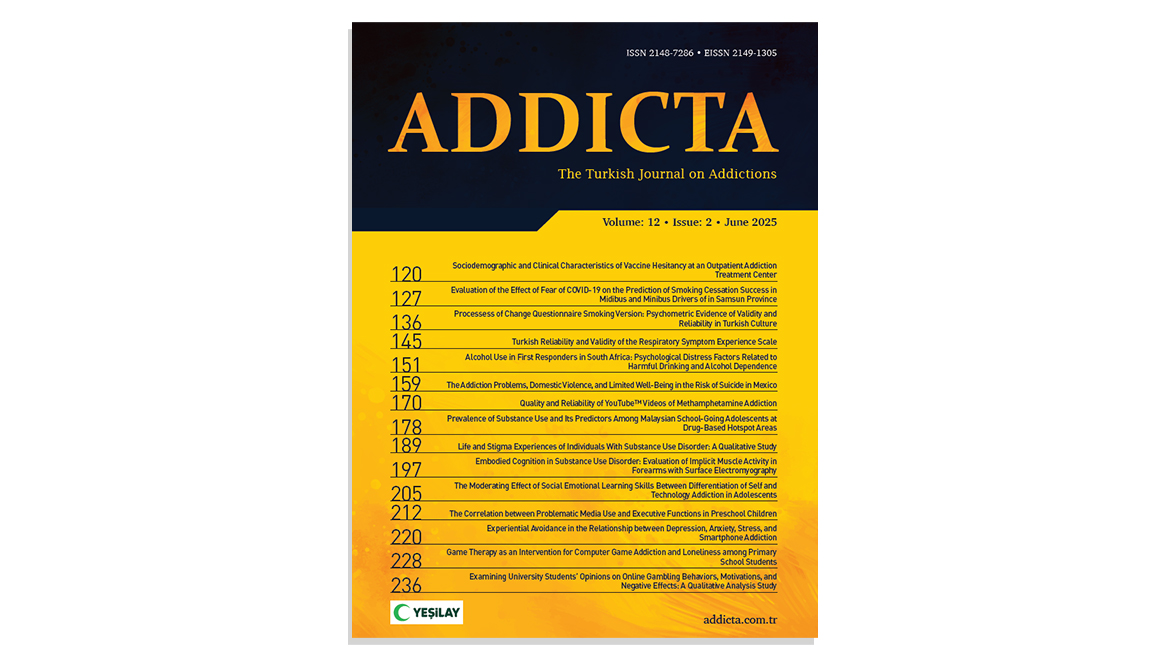
Dear devoted Friends of the Great Green Crescent,
Life is filled with stories. Each of us has one, of..

The Turkish Green Crescent Society has published the second issue of Addicta: The Turkish Journal on Addictions for 2025.
To mark the organization’s 100th anniversary, Addicta has been reimagined with a renewed concept and visual identity. The journal is published in English, with extended abstracts provided in Turkish. Its redesigned website is now live at https://www.addicta.com.tr/.
First launched in 2014, Addicta is a peer-reviewed, international, and interdisciplinary journal dedicated to publishing original research on addiction — a growing global concern. The journal aims to contribute to academic discourse and support the development of addiction-related policies in Türkiye and beyond.
Since 2015, Addicta has been indexed in several prominent national and international databases, including the Emerging Sources Citation Index (ESCI), TÜBİTAK ULAKBİM (Scientific and Technological Research Council of Türkiye) Social Sciences and Humanities Database, InfoBase INDEX, Academic Search Premier (EBSCO) , Turkish Psychiatry Index, China National Knowledge Infrastructure (CNKI) , DOAJ, GALE, and SCOPUS.
Published quarterly by the Turkish Green Crescent Society, Addicta’s upcoming special issue will focus on Behavioral Addictions. Researchers are invited to submit their manuscripts by 30 September 2025.
📌 For submission guidelines and further details, please visit:
https://www.addicta.com.tr/en/special-issue-call-1032
Articles Featured in Addicta Volume 12, Issue 2:
Original Articles
Sociodemographic and Clinical Characteristics of Vaccine Hesitancy at an Outpatient Addiction Treatment Center
Hüseyin Ozan Torun, Burak Akdöner, Pembe Keskinoğlu
Evaluation of the Effect of Fear of COVID-19 on the Prediction of Smoking Cessation Success in Midibus and Minibus Drivers of in Samsun Province
Emre Akgül, H. Nilden Arslan
Processess of Change Questionnaire Smoking Version: Psychometric Evidence of Validity and Reliability in Turkish Culture
Hikmet Yazıcı, Fatma Altun, Mehmet Kokoç, Ayşe Kalyon, Cansu Tosun, Özlem Gelbal Odabaş, Münevver Özdemir, Vildan Saki Aydın, Zümrüt Şen
Turkish Reliability and Validity of the Respiratory Symptom Experience Scale
Ömer Dursun, Cihan Önen
Alcohol Use in First Responders in South Africa: Psychological Distress Factors Related to Harmful Drinking and Alcohol Dependence
Anita Padmanabhanunni, Tyrone Brian Pretorius
The Addiction Problems, Domestic Violence, and Limited Well-Being in the Risk of Suicide in Mexico
Cristian Molina-Pizarro, Olatz Lopez-Fernandez, Ismael Martinez-Nicolas, Paula Villasante-Soriano, Pablo Méndez-Bustos, Fuensanta Aroca-Bisquert, Enrique Baca-García
Quality and Reliability of YouTube™ Videos of Methamphetamine Addiction
Ender Cesur, Buket Koparal
Prevalence of Substance Use and Its Predictors Among Malaysian School-Going Adolescents at Drug-Based Hotspot Areas
Ghaneshinee Sathiyaseelan, Rozmi İsmail, Azmawati Mohammed Nawi, Nurul Shafini Shafurdin, Md Shafiin Shukor
Life and Stigma Experiences of Individuals With Substance Use Disorder: A Qualitative Study
Esra Albal, Gül Dikeç, Gökhan Umut
Embodied Cognition in Substance Use Disorder: Evaluation of Implicit Muscle Activity in Forearms with Surface Electromyography
Mustafa Danışman, Ertuğrul Demirdel, Gamze Zengin İspir, Kübra Sezer Katar, Çağlar Soylu
The Moderating Effect of Social Emotional Learning Skills Between Differentiation of Self and Technology Addiction in Adolescents
Belgin Liman, Suat Kılıçarslan
The Correlation between Problematic Media Use and Executive Functions in Preschool Children
Sevinc Zeynep Kavruk, Raziye Yuksel Dogan, Kevser Tozduman Yarali
Experiential Avoidance in the Relationship between Depression, Anxiety, Stress, and Smartphone Addiction
Muhammed Sevilgen, Özlem Tolan
Game Therapy as an Intervention for Computer Game Addiction and Loneliness among Primary School Students
Tuğba Özdemir, Suna Uysal Yalçın, Azzet Yüksel
Examining University Students’ Opinions on Online Gambling Behaviors, Motivations, and Negative Effects: A Qualitative Analysis Study
Deniz Mertkan Gezgin, Nazire Burçin Hamutoğlu, Ecem Atabay